Silly Spinning Easter Egg Craft
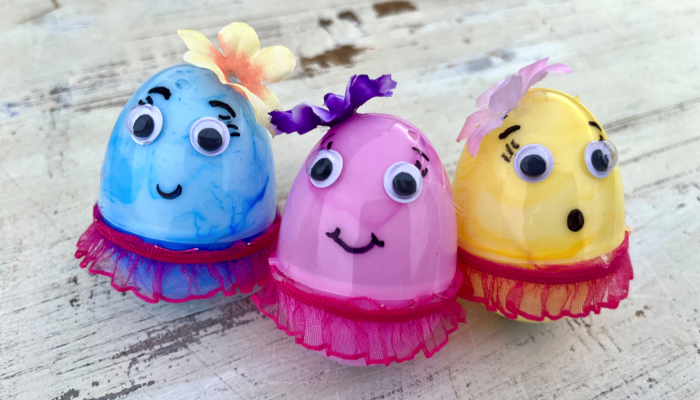
This post may contain affiliate links; please see our terms of use for details.
My kids adore Easter egg hunts. Every year, their grandparents hide eggs all over their yard and let the kids run wild. Afterward, they proudly bring home baskets of plastic Easter eggs full of treats and prizes.
After my kids have opened all the eggs, we’re left with dozens of empty plastic eggs. Having five children, I don’t want plastic eggs lying around for months, cluttering up the already crowded playroom. So what do you do with all those eggs?
I’m on a mission to find some creative ways to use leftover Easter eggs! Last week, we created a Sight Word Easter Egg Hunt game that my third grader has played every day since. This week, I tested out a craft for the little ones in our home.
These Silly Spinning Easter Eggs are cute and a blast to play with. My three-year-old loved sending them twirling across our kitchen floor. I loved that they were simple to make and can be used for a variety of educational activities.
If you’re looking for a fun way to use up those plastic Easter eggs, follow along. With just a few supplies, you and your child can create this Silly Spinning Easter Egg Craft.
Silly Spinning Easter Egg Craft
The best thing about these silly spinning eggs is that you can customize them in a variety of ways. Make them fancy or simple, depending on your preference. Ours look like little ballerinas or hula dancers, but miniature bowties or top hats would make them more manly.
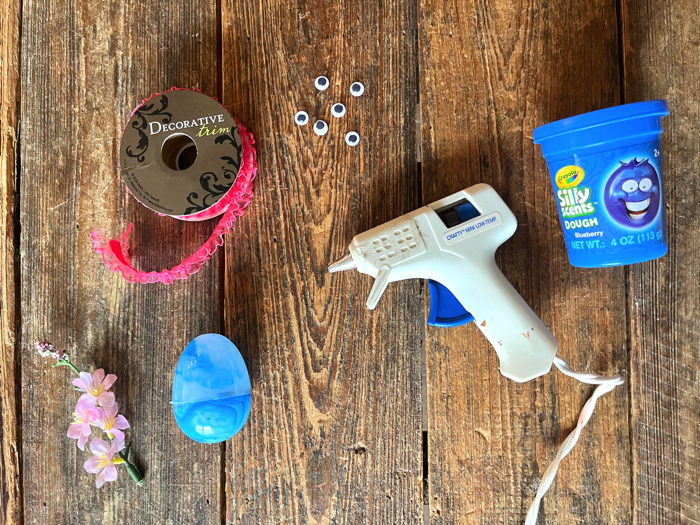
Here’s all you need to get started on this Easter-themed craft:
Materials:
- Plastic Easter eggs
- Sharpie markers
- Hot glue (Or Elmer’s glue)
- Play-doh
- Googly eyes
- Accessories (Ribbon, flowers, bows, sequins, etc.)
Setup:
Before you begin, you’ll want to make sure the area is safe and that you have all the supplies you need.
Safety
I chose to use hot glue to assemble the eggs. Hot glue dries faster than Elmer’s glue and also gives a secure hold. However, this also means my kids couldn’t complete the craft without my supervision.
If you are also using hot glue, you’ll want to prepare an area for the glue gun to sit away from your child. Be sure your child knows that a hot glue gun should only be used when an adult is present. Using a low-temp hot glue gun is the best choice when working with little ones.
Glue in Play-Doh Weight
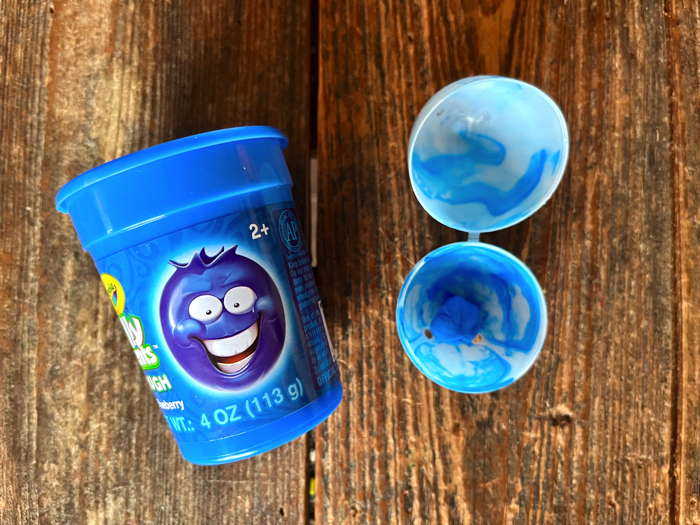
A little weight from a rolled-up piece of playdough is what allows the egg to stand upright. It’s similar to how a Weeble Wobble works. The weight at the bottom causes the egg to return to an upright position after you spin it.
You might want to add this weight in before your child begins so it will sit upright as they decorate it. It may take you a few tries to get the placement and amount of Play-Doh just right.
To do this, roll a small piece of Play-Doh into a ball. Add a drop of glue inside the egg on the bottom. Place the Play-Doh on the glue and allow it to dry.
Test the weight by standing the egg upright. It may lean one way or another, but shouldn’t fall flat on its back.
Time to Craft
Here’s how to assemble these Silly Spinning Easter Eggs:
Step 1: Let your child pick out the egg color of their choice. We found that standard plastic eggs work best. The eggs that come in odd shapes or are coated in glitter are harder to stand up.
If you didn’t add the Play-Doh weight in the bottom of the egg beforehand, you’ll do this now.
Step 2: Add clothes to your egg. We cut a ruffle ribbon in half, lengthwise, to create mini skirts for the eggs. We used a small line of hot glue around the bottom half of the egg to secure the skirt.
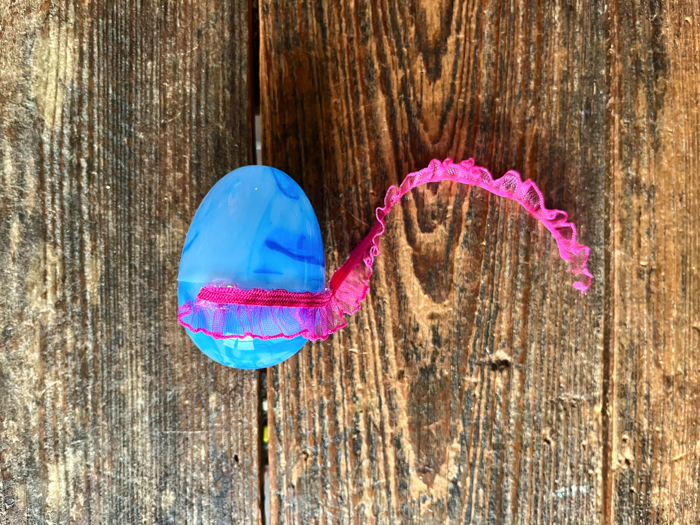
Alternatively, you could use Sharpie markers to draw on your egg’s clothes. Scraps of fabric would also work to create outfits.
Step 3: Attach googly eyes. The hot glue secured the eyes to the eggs immediately. If you’re using Elmer’s glue, you’ll need to remind your child to be patient so the eyes don’t slide around while they’re finishing the egg.
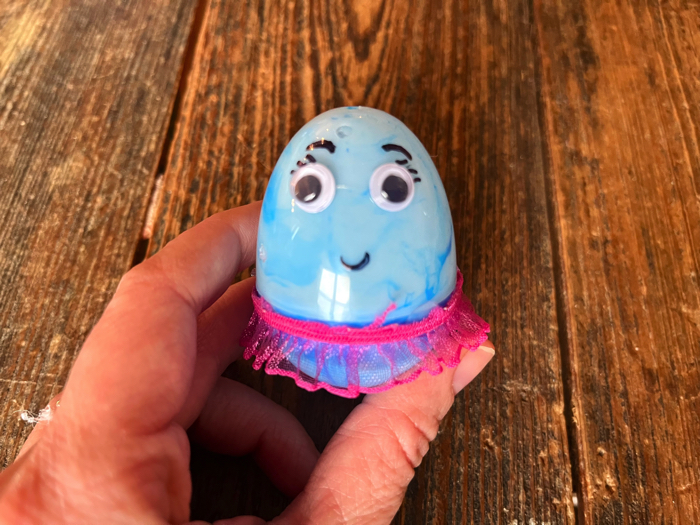
Step 4: Add details with a Sharpie. Most parents like to avoid permanent markers at all costs. However, washable markers just won’t work for this craft.
To protect your child’s clothes, dress them in an old t-shirt or an art apron. If your little one is too small to handle a Sharpie, draw the details for them.
Tip: If your child is overwhelmed by drawing a face on the egg, simplify the task by breaking down the directions into simple shapes.
For example, instead of saying, “Draw a mouth,” you can try saying, “Draw a straight line.” Instead of saying, “Draw eyes,” you can say, “Make a dot with the tip of the marker.” Breaking drawings down into simple shapes is a great way to teach your child how to draw.
Step 5: Add any final touches. We added flowers on their heads to make them fancier. You might add tiny hats, jewelry, freckles, or whatever comes to mind.
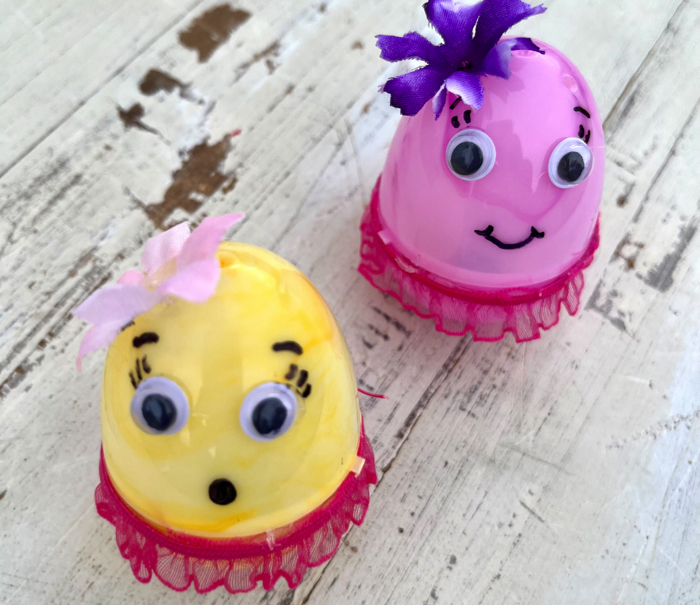
What else can I add to this Easter-themed craft?
Do you have a child who loves to craft? Here are a few other ideas that will keep the activity going:
- Paint an egg carton for the eggs to “live” in.
- Make silly name tags for each egg.
- Decorate an old shoebox to create a “stage” for the spinning eggs to perform on.
- Decorate toilet paper rolls and use them as stands to display the eggs on.
How can we play with Silly Spinning Easter Eggs?
We found that these silly eggs provide a variety of opportunities for both learning and play. Here were our favorite ways to play with the eggs:
Spinning Showcase
When all was said and done, we had a dozen spinning ladies ready for play. With so many hilarious little egg-people, my kids took them to the kitchen floor and tried spinning them as fast as they could. Your child will likely enjoy spinning the eggs over and over to see how fast and far they fly.
Twisting the eggs is a great fine motor activity. Fine motor activities for preschoolers help them develop the small muscles in their hands that are responsible for writing, tying shoes, buttoning shirts, and more.
Hide the Letter
Sneak in some alphabet practice by hiding a letter magnet inside one of the plastic eggs. Show your child the letter before hiding it and have them name the letter and make its sound. Have your child close their eyes and choose one egg to hide it in.
When your child opens their eyes, place several eggs in front of them and spin them just for fun. Ask them to choose the silly spinning egg that contains the letter. Your child can open the eggs until they find the letter.
Silly Egg Mix-Up
My kids have always loved toddler puzzles or games where they can mix and match the tops and bottom of animals, people, or food. Your child can mix and match these silly eggs to create new characters. Opening and closing the eggs will also strengthen their fine motor skills.
What skills does this craft help develop?
These eggs may be silly, but they provide more development opportunities than you may realize. Here are a few of the areas this craft supports:
Fine Motor Skills
Decorating the face, snapping the eggs shut, and gluing on the eyes all use small muscles in your child’s hand. Parents looking to help a child with a fine motor delay should try to include fine motor activities for infants and children in daily play.
Creative Skills
When your child gets to use their imagination to create something beautiful, it gives them a sense of pride and accomplishment. Letting your child utilize their creative skills helps build self-esteem. Simple crafts like these silly Easter eggs allow your child to play with colors, textures, and elements of design.
Language Skills
If you have a little one who is learning to talk, try this tip. While they are busy with this craft, get them talking about what they are doing. Here are a few questions I asked my three-year-old while she was crafting:
- What will you name this silly Easter egg?
- What colors are the eggs?
- If you could hide a surprise in this egg, what would it be?
- What kind of face does this egg have? Are they surprised, happy, or mad?
As your child talks, provide them with gentle instruction or correction. You can also use this opportunity to introduce new vocabulary words. Through conversation, you can turn everyday play opportunities into simple language activities for preschoolers.
What other ways can I enrich this activity?
To enrich this activity, try any of these Easter-themed activities:
- Create an accessible Easter egg hunt in the backyard
- Read the book The Good Egg Presents: The Great Eggscape! by Jory John
- Try one of our glowing Easter egg activities
- Make a tactile Easter craft
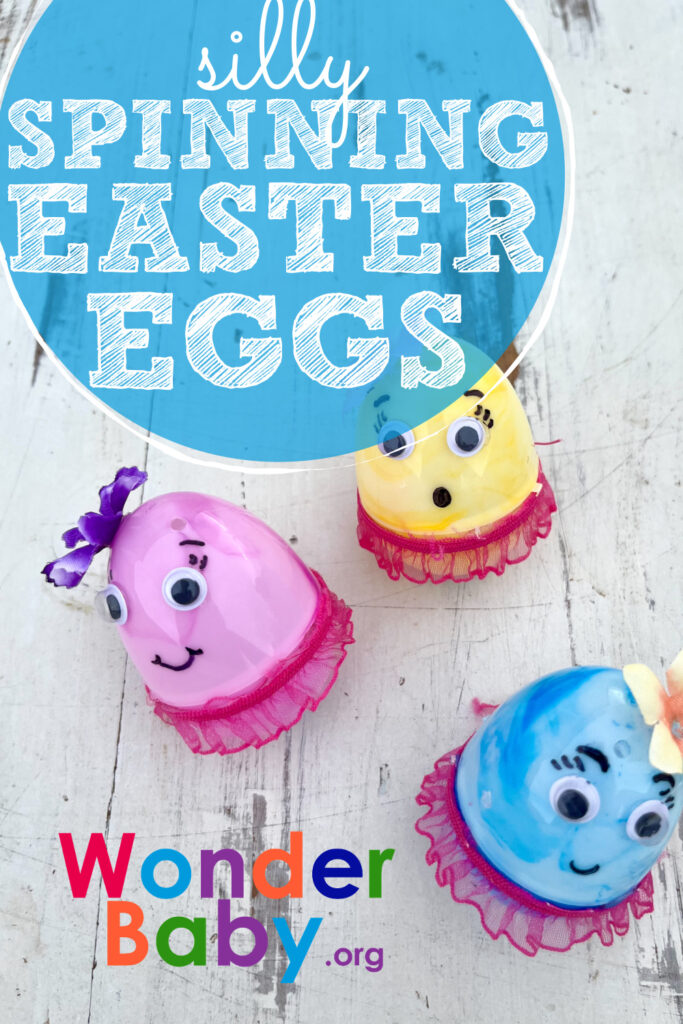
Related Posts
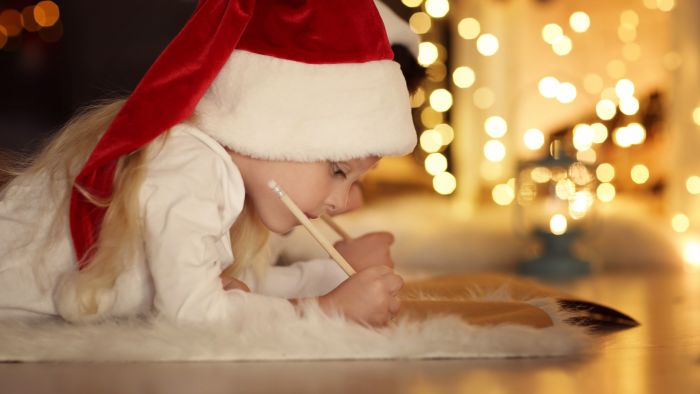
Holiday Crafts and Ideas
Should Parents Lie to Their Kids About Santa Claus?
Should parents lie about Santa? Find out how to balance trust, magic, and holiday traditions right here!
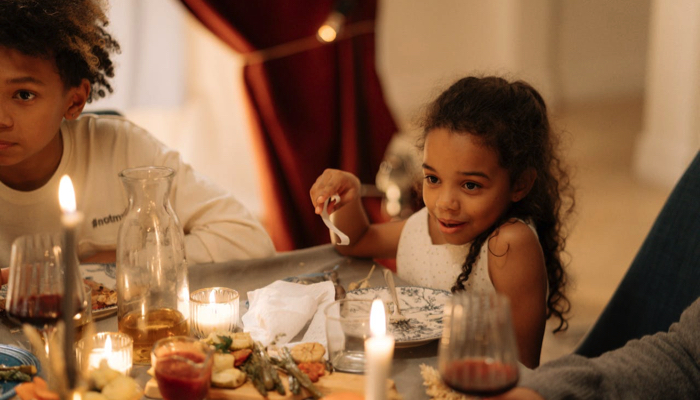
Holiday Crafts and Ideas, Special Needs
5 Tips for a Peaceful Thanksgiving with Your Child with Disabilities
Thanksgiving can be a joyful yet overwhelming holiday, especially for families with children who have sensory, motor, or dietary needs.
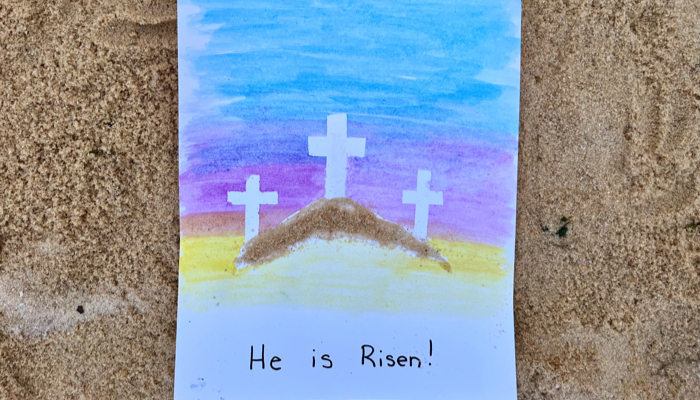
Holiday Crafts and Ideas
Resurrection Water Color Craft
Celebrate Easter with this Resurrection Water Color Craft, perfect for little ones. They’ll love painting the beautiful sky and adding sand to finish it off.
